Steemit Crypto Academy Contest / S6W4 - Internet of Things and the Blockchain
Namaste 🙏 to all of you. This is Lavanya from India.
This is my entry post for ongoing contest Internet of Things and the Blockchain by #SteemitCryptoAcademy community
Now a days, applying blockchain technology to different fields is growing faster. In this Internet of Things (IoT), companies also start applying blockchain technology to their needs for providing the best services to their customers.
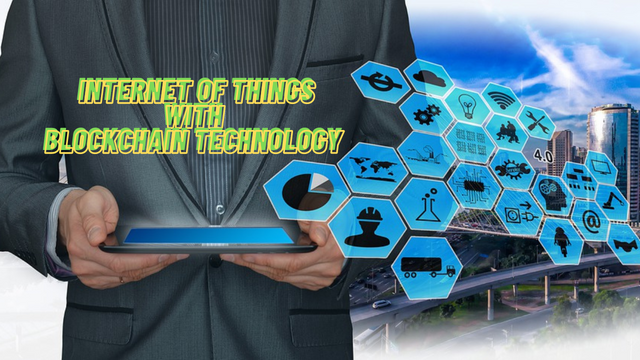
It's very important to understand this technology before applying. Thank you, team, for bringing such a wonderful topic to us.
Explain in your own words, what is the Internet of Things? |
|---|
The Internet of Things (IoT) is the network of physical devices, vehicles, home appliances, and other items embedded with electronics, software, sensors, actuators, and network connectivity that enable these objects to collect and exchange data.
This network of connected objects is able to communicate, interact, and exchange data with other connected devices and systems.
The IoT can be used to monitor, control, and automate everyday objects, such as lights, thermostats, and appliances, as well as more complex systems, such as industrial machines and robots. By connecting these physical objects to the Internet and to each other, the IoT can enable users to collect data, automate processes, and gain insights about their environment that would otherwise be impossible.
These insights can be used to improve efficiency and optimise operations. The IoT is transforming the way we live, work, and interact with the world around us.
Through the use of connected devices and applications, the IoT provides new opportunities to automate and streamline everyday activities, increase efficiency, and create entirely new services and experiences.
The potential of the IoT is vast, and it is rapidly evolving. As new technology is developed and more advanced devices are introduced, the range of applications for the IoT grows.
The IoT can be used to track and monitor physical assets, such as inventory, vehicles, or machinery. It can also be used to monitor environmental conditions, such as temperature, humidity, air quality, and noise levels.
The IoT can also be used to control and automate systems, such as lighting, heating, and cooling.
Additionally, the IoT can be used to create smarter products, such as intelligent home appliances, connected medical devices, and smart personal assistants.
The IoT is revolutionising the way we interact with the world, and it is changing the way businesses and organisations operate.
By connecting devices and systems, businesses can improve operational efficiency, reduce costs, and gain insights about their environment.
The IoT can also provide new opportunities for innovation, such as the development of new products and services. The potential of the IoT is only just beginning to be explored, and the opportunities it offers are immense.
But still, we have a lot of issues like scalability, security, centralization of authority, maintenance costs, and many others. Those we may resolve by applying blockchain technology very easily.
What impact does the blockchain have on the Internet of Things? |
|---|
The blockchain is a revolutionary technology that is changing the way data is stored, shared, and tracked. As such, it is having a major impact on the Internet of Things (IoT).
The blockchain is a distributed ledger system that provides a secure and reliable way of recording, tracking, and transmitting data between devices.
By leveraging the blockchain, IoT devices can securely exchange data without the need for a centralised authority.The blockchain's decentralised nature makes it ideal for the secure transmission of data between IoT devices. Without a centralised entity, the data is more secure and immune to manipulation.
Furthermore, the blockchain's distributed ledger system ensures that data is stored and tracked in a secure and immutable manner. This makes it difficult for data to be corrupted or hacked.
The blockchain also has the potential to improve the cost-effectiveness of IoT networks. By eliminating the need for a centralised authority to verify the data, the cost of running an IoT network is significantly reduced. This can reduce the cost of ownership for businesses and consumers alike.
The blockchain also has the potential to revolutionise the way IoT devices are monitored and managed. By leveraging the blockchain, data can be automatically exchanged between devices, allowing for improved monitoring and control of the devices. This can help reduce costs and improve the reliability of IoT networks.
Finally, the blockchain can also help to ensure data privacy and security. By using blockchain technology, users can control who has access to their data, helping to protect it from unauthorised access. This can help to ensure that the data is kept secure, even in the case of a security breach.
Like those, we get by leveraging blockchain technology in IoT devices.
What benefits does blockchain offer to the Internet of Things? |
|---|
The Internet of Things (IoT) revolution is transforming the way we live and do business. As the number of connected devices continues to grow, the need for secure and reliable data sharing is becoming increasingly important.
The blockchain, an immutable distributed ledger technology, offers numerous benefits to the IoT, including improved security, trust, data privacy, and decentralization.
One of the biggest benefits of blockchain for the IoT is enhanced security. The blockchain is a distributed ledger that stores immutable records of data transactions, making it difficult for malicious actors to tamper with or delete data.
By using blockchain-based smart contracts, IoT networks can be secured against unauthorised access, preventing attackers from modifying the data in transit or on the device itself.
Another benefit of blockchain for the IoT is trust. The blockchain can act as a trusted third party between two parties, eliminating the need for a central authority to manage trust. With blockchain, transactions are cryptographically secured, making it difficult for malicious actors to manipulate the data. This helps to create trust between IoT networks, enabling secure data sharing even between untrusted parties.
Data privacy is another benefit of blockchain for the IoT. With blockchain, data is encrypted and stored on a distributed ledger, making it difficult for unauthorised parties to access or modify the data. This ensures that users’ personal data is kept secure and private, even when shared across multiple IoT networks.
Finally, blockchain enables the decentralization of IoT networks, eliminating the need for a central authority. This makes it easier for users to access and share data while reducing the risk of a single point of failure. With decentralization, users can securely and reliably share data without relying on a central third party.
The potential of blockchain for the IoT is immense, and its use is rapidly gaining traction. As more and more businesses and organisations explore the possibilities of blockchain for their IoT networks, the technology is set to revolutionise the way we interact with the physical world.
like those major advantages we get by applying blockchain technology to IoT devices.
Explain two applications of IoT and blockchain. |
|---|
The potential of blockchain and the Internet of Things (IoT) has been widely discussed in recent years. The combination of these two technologies has the potential to revolutionise many industries.
- The first application of IoT and blockchain is in the healthcare industry.
With the rise of IoT-enabled medical devices and the increasing use of health data, blockchain can provide a secure and transparent way to store and share health information.
This would allow healthcare providers to quickly access and share patient records while also giving patients greater control over their own data.
Furthermore, blockchain could be used to create a distributed network of smart devices that are able to securely share data with each other, allowing for more accurate diagnosis and treatment of medical conditions.
- The second application of IoT and blockchain is in the energy industry.
By allowing energy producers and consumers to securely and transparently exchange information, blockchain could revolutionise the way energy is produced, stored, and consumed.
For example, producers could store and track the data from renewable energy sources, while consumers would have access to real-time data about their energy consumption and production. This could create a more efficient and sustainable energy grid.
Overall, the combination of blockchain and the Internet of Things could have a major impact on a variety of industries, from healthcare to energy. By providing a secure and transparent way to store and share data, these two technologies can create innovative solutions that improve the way we live and work.
Explain a blockchain project that relates to IoT. |
|---|
The rise of the Internet of Things (IoT) has led to a major shift in the way we think about the world around us. Connected devices can now communicate with each other and share data, allowing for new levels of automation and efficiency.
However, this new level of connectivity also brings with it a number of security issues, as these devices are often vulnerable to attack.This is where blockchain technology comes into play.
Blockchain is a distributed ledger technology that allows for secure and immutable data storage as well as reliable peer-to-peer communication.
By combining the secure data storage capabilities of blockchain with the communication capabilities of the IoT, it is possible to create projects that bridge the gap between the two technologies.
One such project is Waltonchain
which uses blockchain to create a secure and reliable distributed ledger for IoT data. By using Waltonchain, companies can securely store, share, and track the data generated by their connected devices.
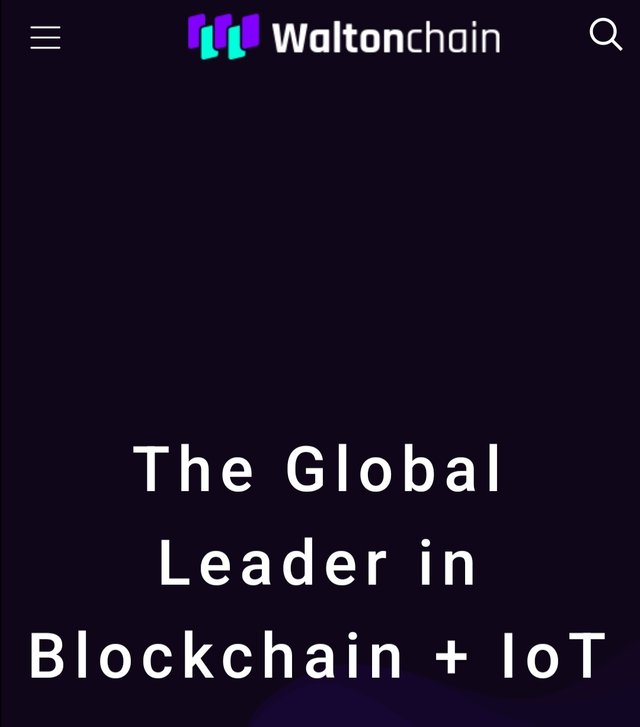
The platform also allows users to create smart contracts that automate payments, asset transfers, and other transactions.
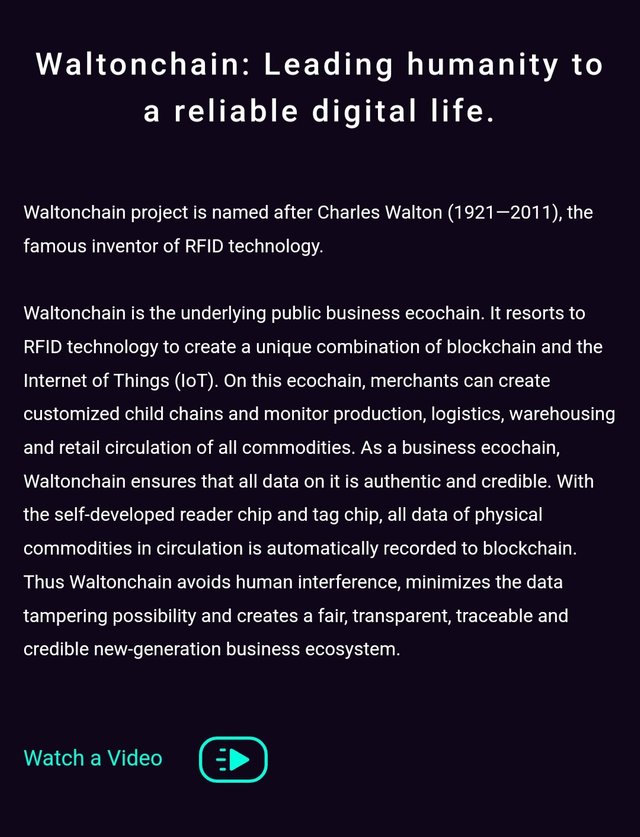
In addition to Waltonchain, there are other projects that are leveraging the power of blockchain to create secure and reliable IoT networks. Companies such as IOTA, VeChain, and Qtum are all working to create secure, immutable, and distributed ledgers for IoT data.
Another project is atonomi.io.
Atonomi is a blockchain-based project that seeks to provide secure, trusted, and verifiable identity, reputation, and trustworthiness for Internet of Things (IoT) devices.

It was developed by the Atonomi Network, a subsidiary of CENTRI Technology, to help secure the billions of IoT devices that are expected to be connected to the internet within the next few years.At its core, Atonomi uses blockchain technology to enable secure identity, reputation, and trustworthiness for IoT devices.
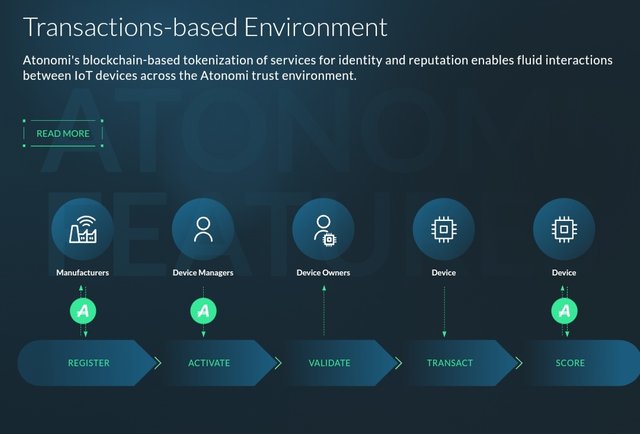
Atonomi uses a decentralised network of nodes to store and verify the identity information of each device. This data is then used to assign each device a unique, immutable digital identity that can be used to secure communication between devices, prevent malicious actors from accessing data, and ensure that devices are authenticated and trusted before they are granted access to the network.
The Atonomi Network is designed to be open and accessible to all users, regardless of their level of technical expertise. This enables developers to quickly and easily create and deploy applications that interact with the network and access its data. This makes it easier for developers to build innovative new applications and services that leverage the Atonomi Network’s secure and trusted environment.
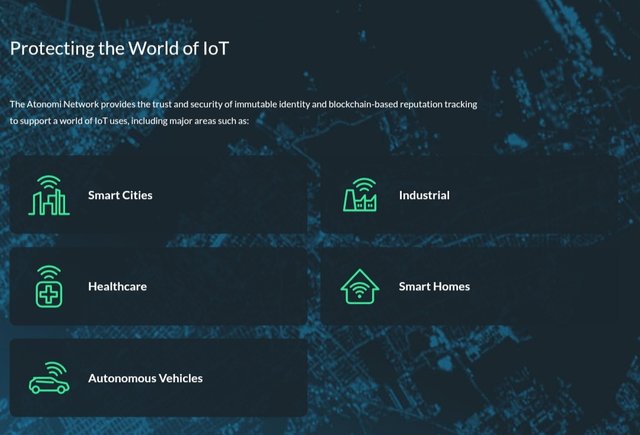
Atonomi also provides a secure, auditable, and immutable ledger for storing and managing the identity data of connected devices. This ledger records the identity data of each device, as well as its associated reputation, trustworthiness, and other information. This ledger is maintained by a series of nodes running the Atonomi Network software, which ensures that the network remains secure and resilient.
As the field of IoT continues to evolve, these projects will continue to provide the secure infrastructure needed for connected devices to communicate and share data securely.
Ultimately, the combination of blockchain and IoT has the potential to revolutionise the way we think about the world around us. From homes to factories, the ability to securely store, share, and manage data from connected devices will enable us to create more efficient and automated systems that can benefit us in a variety of ways.
Conclusion |
|---|
A blockchain project that relates to the Internet of Things is a powerful tool that can help to increase transparency, security, and efficiency within many industries.
It has the potential to revolutionise how businesses and organisations interact with each other, as well as how devices communicate with each other.
By using the blockchain to store, receive, and transmit data, it can create a secure, immutable, and distributed ledger that can be used to track the movement of goods, making it an invaluable tool for IoT applications.
I would like to invite my friends to participate in this contest: @msdbitco, @shohana1, @simonnwigwe, @chiabertrand, @nevlu123, and @harferri.
Thank you so much for reading my article!.
You have always given us quality and interesting articles dear friend, and this week's own is really very informative and detailed.
The Internet of Things (IoT) has become a popular way for businesses to increase the efficiency of their operations. It allows them to connect physical devices to the internet and share data between them, leading to improved performance and better customer service.
Blockchain technology offers several advantages when it comes to securing data on the IoT. Blockchain is a secure, distributed ledger technology that enables multiple parties to securely store and manage data without relying on a centralized authority.
Thanks for sharing friend, and goodluck in this contest. #steem-on.
I will appreciate if you equally engage on Mine
Thanks for lovely feed back.
Upvoted! Thank you for supporting witness @jswit.
Great explain my friend, best of luck,have a great day.
Thank you my friend.
Atonomi and walton chain both are seems to be great future projects made with the combination of IoT and Blockchain.
Yes dear.But it took time to give best results.
Of course it will take time to get stable and to give good service.
Happy night friend 🙏
The Internet of Things has changed the world. Now everything is more automated, and that greatly helps everyone.
It's amazing how technology has changed everything. Smart homes are getting bigger, there is better data recording and an infinity of incredible benefits.
Thank you very much for sharing.
Best regards 🌺
Well said, our needs are increasing day by day, so for full fulfillment, technology must need development. From here, blockchain plays a big role in upcoming IoT things.
Thanks for stopping by my post. Take care of you, dear.
Your post has been supported by @josepha from team 2 of the Community Curation Program, at 40%. We invite you to continue sharing quality content on the platform, and continue to enjoy support, and also a likely spot in our weekly top 7.
Voting date: 14/12/2022
Very great and interesting 👍🏼👍🏼
It's always good to read your post because you would always write quality post on these contests.
I agree with you that security remains one of the biggest threat about IoT because most of them are in the hands of the central authority and can be easily hacked anytime.
The blockchain makes IoT more secured because the cryptography that is used to guide it makes it very hard to be hacked and our information on IoT devices remain safe in that way. I wish you the best in this contest.
Blockchain has brought the world to be more sophisticated and has high security because of its decentralized nature. Its uses are also growing over time, and IoT is a very good companion. These two can create a job that facilitates and facilitates human work and has a low level of risk.
The development of these two technologies has also progressed to giant Chinese companies, where the country has advanced technological devices in almost all of its sectors.
Wish you luck dear... 👍